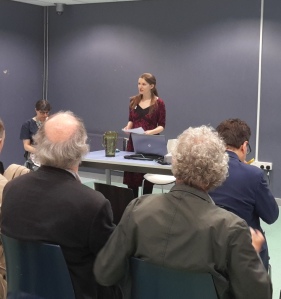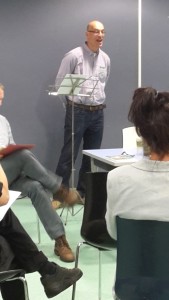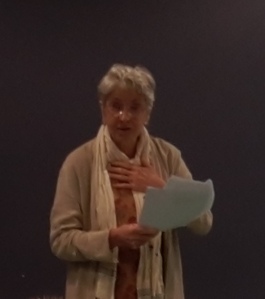This week’s blog follows on from my last update, which discussed the morning lectures at our recent Special Collections Symposium held to launch the catalogue of the Mitrinović Archive, due to go online in November.
In the afternoon it was the turn of the collection to take centre stage. I spoke about the history of the Archive and Library, outlining how they came together, their care and growth under the management of Dimitrije Mitrinović’s circle, and the role of the New Atlantis Foundation (now Mitrinović Foundation) in ensuring the survival of the records and books with a real regard for the value of provenance. The NAF was also instrumental in securing homes for the Mitrinović’s collection firstly at Belgrade, and later at Bradford, using their connections with Andrew Rigby, then of the Peace Studies department. The Foundation continues to support the collection, such as by funding this current cataloguing project.
I tried to convey the research potential of the collection, listing some of the significant contacts the group Mitrinović had and a few of the numerous subject areas the collection covers from intentional communities to the history of psychology, Modernist art to Social Credit, and embracing such diverse figures as Nobel prize-winning chemist Frederick Soddy, Edith Sitwell and S.G. Hobson. Artists, politicians, writers, philosophers, political theorists, etc. all came into contact with Mitrinović, often with interesting results. I wanted to convey the complexity, and therefore the richness, of the collection. A multi-lingual collection where much of the archive cross-refers to, or results from the study of, other parts and connects to Mitrinović’s library make cataloguing challenging, but result from and create the breadth and depth that have become fully apparent in the course of this project.
We were fortunate to have Dr Tom Steele with us to bring in the local, Yorkshire side of Mitrinović’s story. Dr Steele discussed A.R. Orage and the Leeds Arts Club, showing the pioneering role the Club played in bringing Nietzscheism and the avant garde to a wider audience. Dr Steele showed how Leeds became a centre for modernism across the arts through such figures as Orage, Michael Sadler and Bradford’s Tom Heron. I had always been curious about the fact that Mitrinović’s first public lecture in Britain was delivered at the University of Leeds in 1915. Dr Steele’s portrait of the city made it clear that Leeds was an obvious location for Mitrinović’s talk on the sculptor Ivan Meštrović. It emerged that the intellectual currents that had seized hold of Orage were the same as those driving Mitrinović. No wonder Orage hired Mitrinović as a columnist for his radical journal, The New Age, giving Mitrinović a platform for his ideas.
Special Collections Assistant and author Martin Levy tackled a complex aspect of Mitrinović’s life when he chose to look at his relationship with the German philosopher Erich Gutkind. Levy described how the two met in 1914 after Mitrinović read and was utterly blown away by Gutkind’s Sidereal Birth. He would later state that if Gutkind hadn’t written the book, he himself would have had to, so central was it to his own philosophy. Together with Kandinsky they conceived a project to form an intellectual and artistic elite, the Blutbund, which would lead a change in the world. They planned to produce a yearbook as a follow-up to the Blaue Reiter Almanac. The First World War intervened, stirring up nationalist feelings and placing individuals in jeopardy. Mitrinović, for one, fled to England, taking Gutkind’s ideas with him. They would be core reading for anyone wishing to study with him for the rest of his life. Levy spoke about the hardship Gutkind faced when in 1933 and with Storm Troopers at his door, he and his wife Lucie fled to America. He struggled financially and his ideas never really took hold as he might have hoped. This lack of popularity led to an interesting discussion about the complexity of his and Mitrinović’s writing, its roots in poetic Russian philosophy and the possible purposes behind it.
Feedback I’ve received after the Symposium suggests that the final speakers of the day were the most intriguing. John MacDermot and Margaret Shillan are trustees of the Mitrinović Foundation who grew up in the community he and his circle established at Richmond. John’s talk looked at Mitrinović and the group as collectors of art, discussing their patronage of such well-known figures as Miro, Picasso, Magritte and Roy de Maistre. I found it interesting to hear how artworks were shared amongst the group. Never bought as an investment, but always chosen for their beauty and meaning, paintings, sculptures, antiquities and craft pieces were given as gifts. For example, John shared his memory of being given a walking stick by Mitrinović himself, who collected them.
Margaret Shillan looked at the elegant house of Norfolk Lodge, Richmond, which the group acquired in the 1940s and where Mitrinović lived out his days amongst his close friends. After his death, various members of the New Atlantis Foundation group continued to live in the house until it was eventually sold. Margaret described how each of the public rooms functioned, which neatly set the art collection in context and illustrated the sorts of activities the Foundation was engaged in. In both of their presentations and the subsequent discussion, Margaret and John gave us a sense of the community that formed around Mitrinović, bound to each other through what they termed a “Personal Alliance”. Both shared memories of Mitrinović and Norfolk Lodge that brought them to life. These were uniquely personal contributions, not often seen at an academic event and fascinating for those who were there.
We were fortunate to find a range of speakers for our symposium, exemplifying some of the major subject areas represented in the collection. One of the exciting things about organising the event was the huge range of possibilities I had for subject matter. I felt that our programme succeeded in reflecting something of the breadth of Mitrinović’s life and interests, but it was a pleasant surprise on the day to find how well the various talks connected to each other. Themes emerged across the day: the influence of Nietzsche, Mitrinović’s skill as an operator – building networks and somehow obtaining funding for his ventures, the tensions between personal development and public action for societal change, federalism and devolution, all appeared in various lectures. The diversity of Mitrinović’s interests and activities means that there is a great deal to research in the Archive and Library, and indeed several speakers are already planning return visits. Together with the Mitrinović Foundation, we are considering how we might organise future events based around the collection after the current project finishes. Watch this space!





I’d like to know more about The New Britain Movement, in particular one of its goals, namely the Social Credit. I assume the archive would have info about this, correct? Would such info be made available online in November?
LikeLike
Hi Richard,
Thank you for your interest in the collection. The New Britain Movement is well worth studying, and there is material in the Mitrinovic collection that would shed light on its support for Social Credit.
The Mitrinovic Library has a number of books on Social Credit, which members of New Britain would have been familiar with. You will soon be able to search the new archive catalogue for yourself soon to find out which files in the archive might be of interest to you, but you will still need to contact Special Collections and arrange a visit in order to see that material. Email special-collections@bradford.ac.uk to make an appointment and find out more.
You’ll be able to find the archive catalogue on the Special Collections webpages shortly: http://www.bradford.ac.uk/library/special-collections/.
In the meantime, you may be able to access copies of ‘The New Age’ elsewhere, which heavily supported Social Credit and which also published work by Mitrinovic in 1920 -1921. Chapter 6 of Andrew Rigby’s biography covers the New Britain and New Europe groups, which would also be relevant for you. The biography is available online for free here: http://www.mitrinovic-foundation.org.uk/books.
I hope that this gives you enough to get started and wish you good luck with your research!
LikeLike
Emma – thanks ever so much. the info you provided is most helpful. I would like to get a better idea of how extensive the materials on/about the social credit are and might consider applying for a Fulbright Scholarship &/or sabbatical leave if warranted so I could examine them sufficiently for research purposes. Would the Foundation be amenable to such a pursuit, or who might I contact to find out? Thanks again.
LikeLike
Hi Richard,
Very happy to help! I think the best thing would be to email the main Special Collections email address, special-collections@bradford.ac.uk. This is (sadly!) my final week working on the Mitrinovic Project so you would need to make sure that my colleagues are able to assist with any planned visits/ research trips. There is a planned refurbishment project here which might well affect your access to the Mitrinovic collection, so it is vital to double-check all arrangements before you go ahead with an application!
As for the volume of material, a search of the Mitrinovic Library catalogue brings up 16 works relating to Social Credit, plus you would want to see the New Britain, Eleventh Hour and New Age magazines (which you may be able to find at other libraries). It is a bit difficult to judge how much there is in the archive, so I do suggest that you search the catalogue for yourself. It will shortly be available on the Special Collections webpages.
I am sorry if this is a little vague, but our Special Collections Librarian and the archive catalogue itself should be able to assist you further.
Best wishes,
Emma
LikeLike
Thanks Emma. You’ve provided sufficient info for me to take it from here as I get my schedule and plans in order. Wishing you well in your post Mitrinovic Project endeavors.
Richard K Caputo, PhD., Professor of Social Policy & Research Wurzweiler School of Social Work – Yeshiva University – Wilf Campus 2495 Amsterdam Ave., New York, NY 10033-3299 O: 212-960-6934 F: 212-960-0821 E: caputo@yu.edu NLS@50 Policy Analysis for Social Workers Listed among 100 Great Books for Social Workers Library US Social Welfare Reform: Policy Transitions from 1981 to the Present Basic Income Guarantee and Politics
________________________________
LikeLiked by 1 person